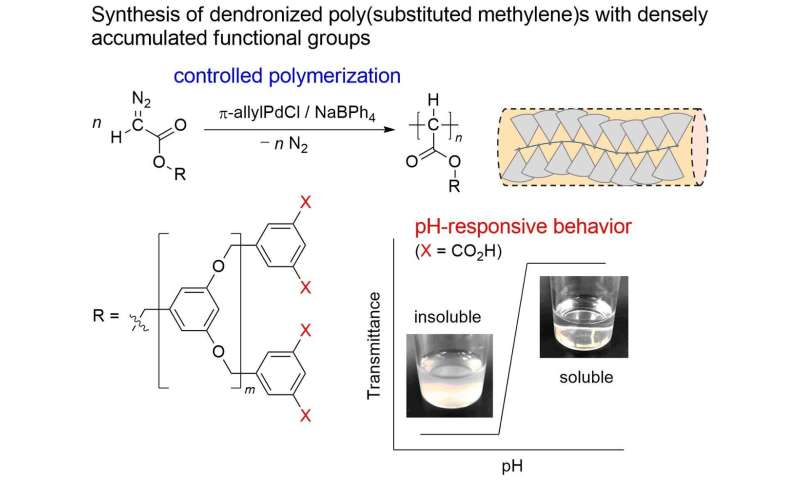C1 polymerization is a useful technique for preparing polymers with a carbon-carbon main chain. This technique constructs a polymer backbone from 'one carbon unit,' in contrast to conventional vinyl polymerization, which produces polymers from a 'two carbon unit' derived from vinyl groups. The representative characteristic of C1 polymerization is that it can yield carbon-carbon main polymers having a substituent on each main chain carbon atom [poly(substituted methylene)s]. For the C1 polymerization system, diazoacetates are suitable monomers, yielding polymers with an alkoxycarbonyl group (ester) on each main chain carbon atom.
Stimuli-responsive polymers or smart polymers are macromolecules that undergo a change in properties in response toexternal stimuli, such as temperature, pH, light, and additives. Their stimuli-responsive behavior strongly depends on the primary structure of thepolymer, and thus precise synthesis is necessary to develop smart materials with superior properties. Precise C1 polymerization for diazoacetates is still a challenge, whereas various controlled/livingpolymerizationtechniques of vinyl monomers have been achieved to give well-defined stimuli-responsive vinyl polymers.
In this context, with the results reported in this report, we have demonstrated that diazoacetates with a sterically bulky substituent can be polymerized in a controlled manner with the π-allylPdCl/borate systems to yield polymers with narrow molecular weight distribution. In addition, we have successfully synthesized carboxy-functionalized dendronized polymers and demonstrated the characteristic pH-responsive behavior derived from the dense accumulation of the side chains in comparison to the correspondingvinylpolymers bearing the same side chains. The introduction of functional groups, other than a carboxy group, in the peripheral phenyl groups should result in a high density of the functional groups around the rigid main chain. These structural characteristics will lead to development of a variety of new functional poly(substituted methylene)s in the near future.
 pH-responsive dendronized poly(substituted methylene)s prepared by C1 polymerization of dendron-containing diazoacetates. Credit: Ehime University
pH-responsive dendronized poly(substituted methylene)s prepared by C1 polymerization of dendron-containing diazoacetates. Credit: Ehime University
Explore further
New palladium-based initiating systems for C1 polymerization of diazoacetates
Provided by Ehime University

